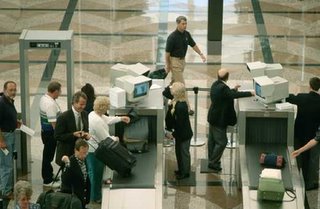 You really do wonder about the quality of MEPs these days, not that I have ever been particularly impressed with the species.
You really do wonder about the quality of MEPs these days, not that I have ever been particularly impressed with the species.The latest to make rather odd comments is the Italian chairman of the EU's transport committee, Paolo Costa, who is complaining that a revised EU regulation setting out detailed security measures which must be taken at civil airports could backfire and provide terrorists with a set of guidelines on how to skirt security checks.
This is according to UPI referring to Commission Regulation (EC) No 240/2006 of 10 February 2006 amending Regulation (EC) No 622/2003 laying down measures for the implementation of the common basic standards on aviation security.
Had Costa bothered to check the text of the regulation, however, he would have seen a very unusual legal text, which states that, "in order to prevent unlawful acts" the measures imposed by the law "should be secret and should not be published."
Thus it is that the EU is not only passing laws in secret – when they get to the Council of Ministers – but in this particular instance, the detail of the law is secret as well.
Perhaps a more substantive objection, however, comes from Conservative MEP Phillip Bradbourne, who argues that having a single set of harmonising rules to cover all 25 member states could reduce rather than increase security. "If a member state is facing a particular terrorist threat and wants to apply more stringent measures," he says, "it can not do so urgently because it will need Brussels’ approval".
What Bradbourne is referring to is a little-known principle of Community law known as the "occupied field". What this means is that, once the EU has legislated in an area of its competence – as laid down by the treaties – even though the legislation may not be comprehensive, the area or "field" is deemed to be "occupied". The significant of this is that member states are then specifically prohibited from making their own laws in that field, without the express permission of the commission.
As this, in the ordinary course of events, may take several months – and permission is by no means assured if the commission is intending to bring out its own legislation – Bradbourne has a good point. A national authority, on becoming aware of a threat, might want to rush out a new control and, in the UK as in other legislatures, this can be done in an emergency in less that 24 hours.
EU involvement, therefore, slows down the whole process and could leave gaps which could be exploited by terrorists while the bureaucrats catch up. I suppose this could be called "the curse of the occupied field".
COMMENT THREAD
No comments:
Post a Comment
Note: only a member of this blog may post a comment.